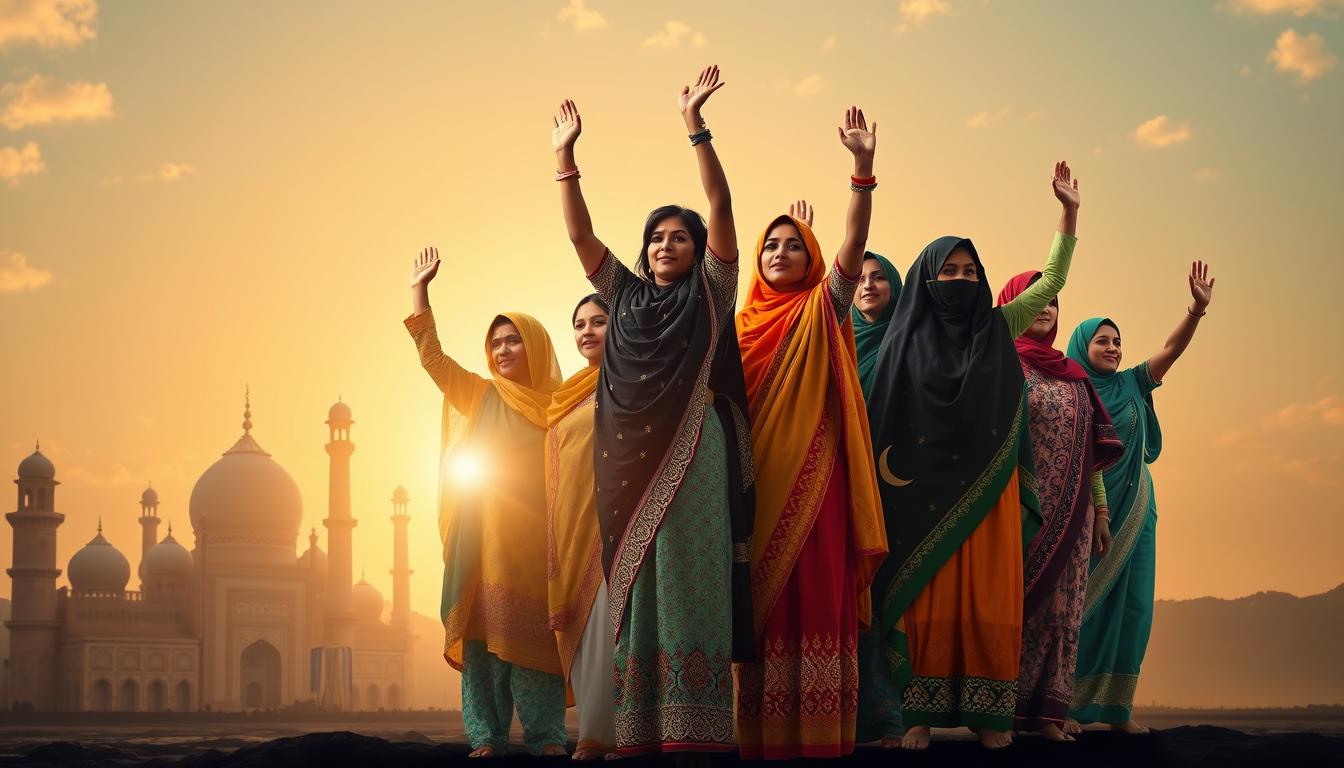In Pakistan, a nation with strong patriarchal norms, women are finding their voice. They are demanding their rights and fighting for equality. This movement is changing the country, making it more just for everyone.
Pakistani women are no longer quiet. They are standing up against injustice and demanding respect. Their efforts, from local to national levels, are making a big difference. They are pushing for a society where everyone is treated equally.
Key Takeaways
- Women in Pakistan are breaking the silence and demanding their fundamental rights
- The battle for gender equality and women’s empowerment is gaining momentum
- Activists and organizations are challenging patriarchal norms and cultural traditions
- Women are speaking out against discrimination, violence, and oppression
- Grassroots movements and national campaigns are sparking conversations and igniting change
The Struggle for Gender Equality in Pakistan
In Pakistan, the fight for gender equality is ongoing. Women’s rights movements lead the charge against the patriarchal society. Despite many challenges, progress is slow but steady.
Traditional cultural norms and religious beliefs are big hurdles. They often favor men’s rights over women’s freedoms. This leads to discrimination in education, jobs, and politics.
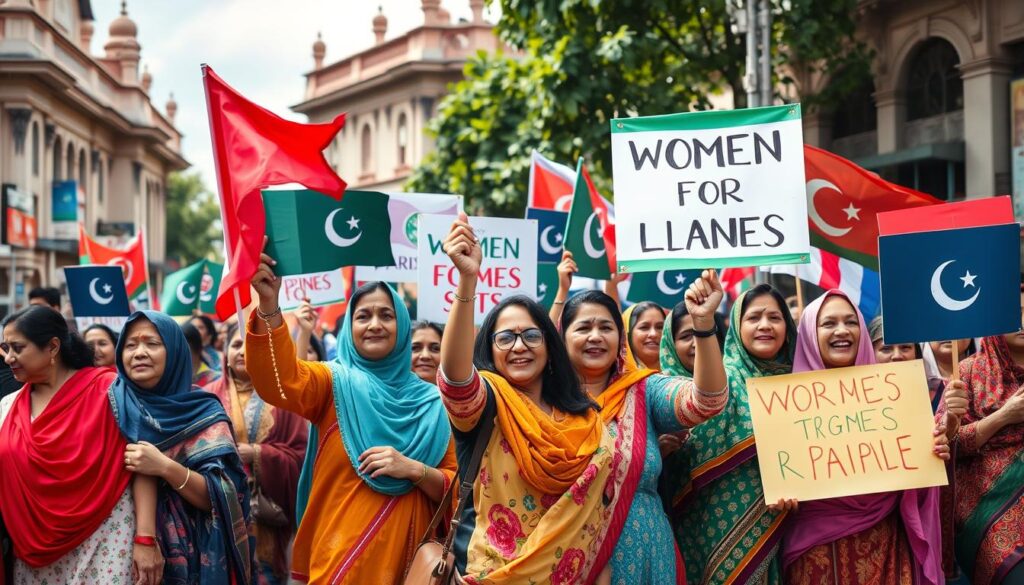
Women’s rights movements in Pakistan are key to change. They stage protests, push for laws, and help women facing violence.
“We will not be silenced. We will continue to fight for our rights until every woman in Pakistan can live with dignity and respect.” – Activist Gulalai Ismail
There have been some wins. In 2018, Pakistan passed a law protecting transgender people. The government also started programs to help girls in school and women in work.
The fight for gender equality in Pakistan is not over. But, thanks to women’s rights movements and supporters, there’s hope for a fair future for all.
Patriarchal Society and Its Impact on Women’s Rights
Pakistan’s patriarchal society deeply affects women’s rights, causing gender inequality. Women are mainly seen as caregivers, stuck in the home. This limits their opportunities and freedom.
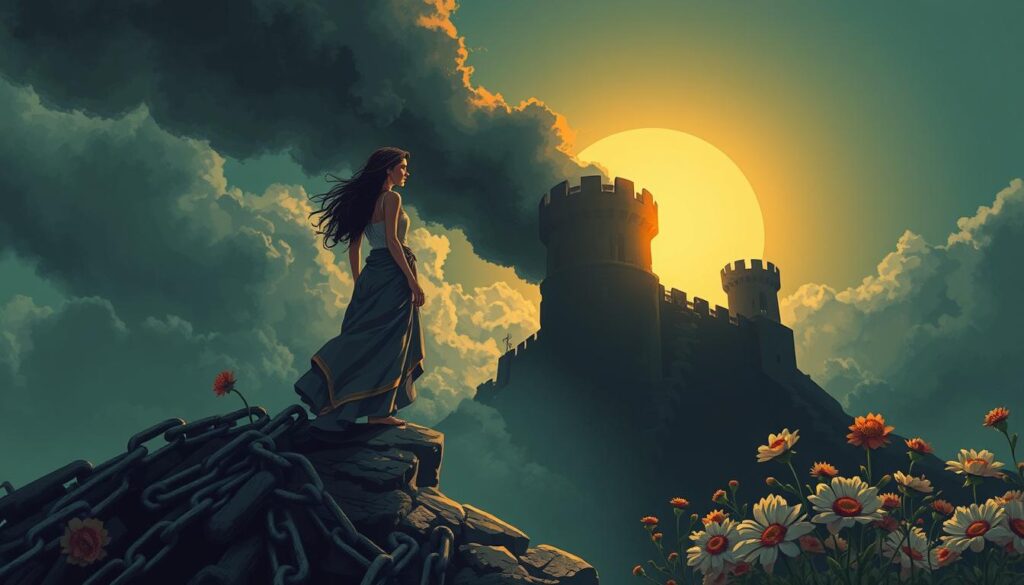
Women face many barriers in education, work, and making decisions. Cultural norms and stereotypes make it hard for them to fight for their rights. They struggle to achieve equality in life.
Cultural Norms and Traditions Limiting Women’s Freedoms
Pakistan’s cultural norms are shaped by patriarchal values. Men are seen as the leaders, and women are expected to care for the family. This restricts women’s freedom and goals.
“In our society, a woman’s place is in the home. Her primary duty is to take care of her husband, children, and household chores. Anything beyond that is often seen as a violation of cultural norms.” – Fatima, a Pakistani woman
Women who don’t follow these cultural norms face criticism and violence. They are silenced and denied their rights.
The Role of Religion in Shaping Gender Roles
Religion shapes gender roles in Pakistan. Religious teachings aim for equality, but patriarchal views often win. Men dominate religious leadership, leading to biased views.
Religious texts are misinterpreted to justify women’s subordination. Women are expected to follow strict rules and prioritize family duties. This makes it hard for them to demand equal rights.
But, some religious scholars and activists are pushing for change. They aim to show that true religion supports equality for all, regardless of gender.
Women’s Movements and Activism in Pakistan
In Pakistan, women’s movements have been key in the fight for equality. They raise awareness and push for change in a society with deep-rooted patriarchal norms.
Historical Overview of Women’s Rights Movements
The fight for women’s rights in Pakistan started in 1947. Women activists and groups have led this fight. They challenge laws and cultural practices that hold women back.
The Women’s Action Forum, started in 1981, is a major force. It fights against oppressive laws and pushes for women’s rights.
Key Figures and Organizations Leading the Fight
Many women have become key figures in Pakistan’s fight for women’s rights. Fatima Jinnah, Muhammad Ali Jinnah’s sister, advocated for women’s political rights. Asma Jahangir, a human rights lawyer, co-founded the Human Rights Commission of Pakistan and fought for women’s rights until her death in 2018.
The Aurat Foundation, started in 1986, is another important organization. It works towards women’s empowerment and gender equality.
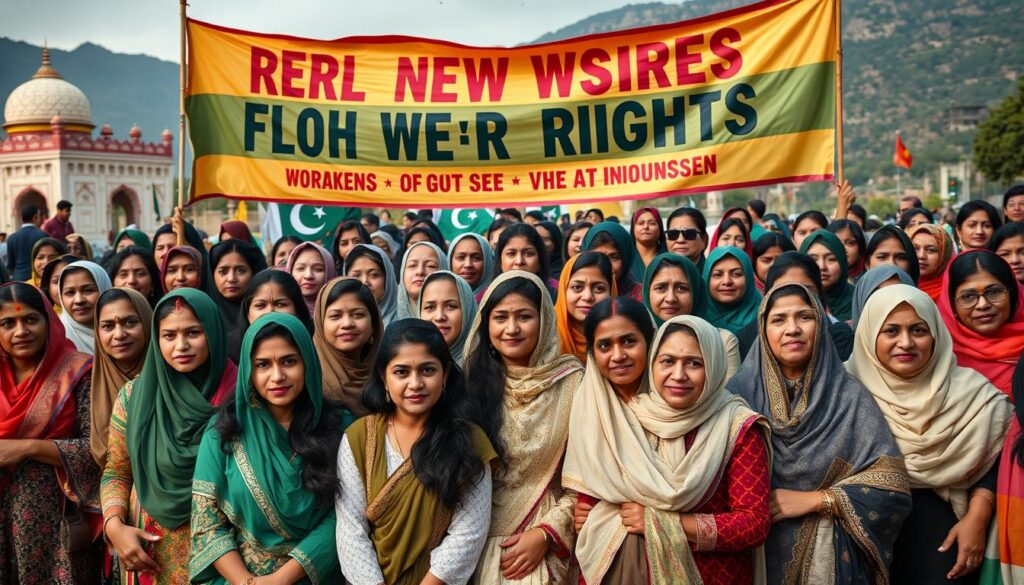
Challenges Faced by Women’s Rights Activists
Women’s rights activists in Pakistan face many challenges. They meet resistance from those who see their work as a threat to traditional values. Activists also face violence, harassment, and intimidation.
The lack of political will and inadequate legal protections make change hard. But activists keep fighting for a more just society.
“We have a long way to go, but we are determined to keep fighting until every woman in Pakistan can live with dignity, free from discrimination and violence.” – Farzana Bari, Pakistani feminist and activist
Despite challenges, women’s movements in Pakistan keep pushing forward. They have made progress, like laws against domestic violence and sexual harassment. But there’s still much to do to protect and promote women’s rights in all areas of life.
Legal Framework and Policies Affecting Women’s Rights
Pakistan’s laws and policies greatly influence women’s rights. The Constitution of Pakistan says everyone is equal, including men and women. But, in reality, many laws and practices still discriminate against women.
Constitution of Pakistan and Gender Equality
The Constitution of Pakistan was adopted in 1973. It promises equal rights to all citizens, no matter their gender. Article 25 makes it clear that women should have the same opportunities as men in all areas of life.
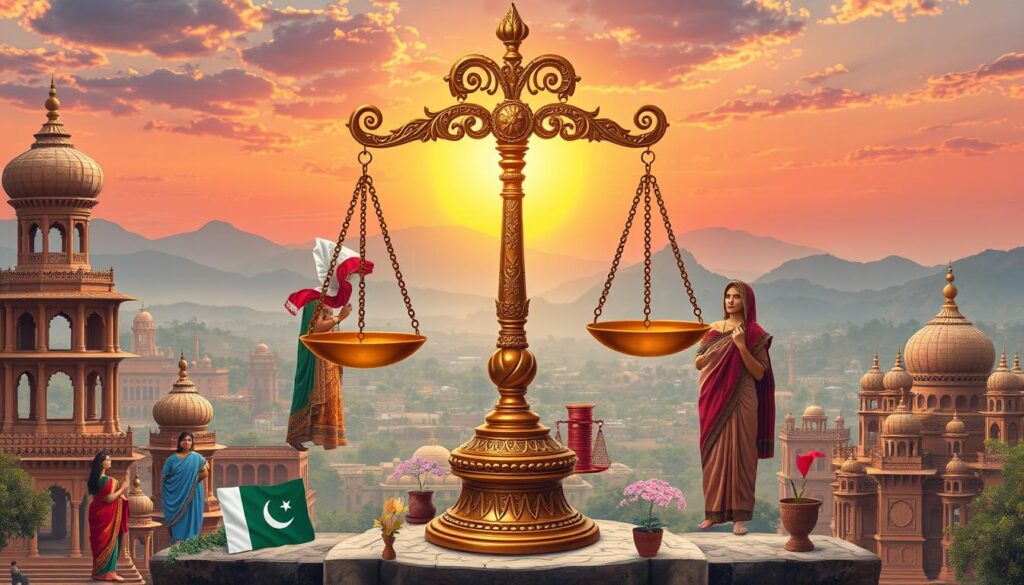
Discriminatory Laws and Their Impact on Women
Even with the Constitution’s promise of equality, Pakistan has laws that unfairly treat women. The Hudood Ordinances, introduced in 1979, make it hard for women to get justice in sexual violence cases. If a woman reports rape without four male witnesses, she could be charged with adultery.
Other unfair laws include the Qanun-e-Shahadat Order of 1984 and the Citizenship Act of 1951. These laws affect women’s rights, making it hard for them to access justice and limiting their freedoms.
Efforts to Reform and Introduce Pro-Women Legislation
Women’s rights activists and lawmakers are working to change these unfair laws. In 2006, the Protection of Women Act was passed. It made it easier for women to report rape without fear of being charged themselves.
Other important laws include the Prevention of Anti-Women Practices Act of 2011 and the Acid Control and Acid Crime Prevention Act of 2011. These laws aim to protect women from forced marriages, acid attacks, and other harmful practices.
While these laws are a step in the right direction, they are not always enforced. Changing deep-rooted beliefs and improving enforcement is crucial. Advocacy and education are key to making these laws work for Pakistani women.
Pakistan Women’s Rights: Progress and Setbacks
The fight for women’s rights in Pakistan has been long and hard. There have been some wins, like more girls going to school and more women working. But, women still face big challenges and unfair treatment in many areas of life.
Girls’ education has seen some progress. Now, 73% of young girls go to primary school. But, only 8% of women go to college. This shows that many barriers and societal pressures stop women from studying more.
Women in Pakistan also face big challenges in work. In the textile industry, women earn 34% less than men. Only 40% of women in education get paid the same as men. These facts show how hard it is for women to earn money and move up in their careers.
“Despite the challenges, Pakistani women continue to demonstrate resilience and determination in their fight for equality. Their unwavering spirit and the tireless efforts of activists offer hope for a more inclusive and equitable future.”
Violence against women is a big problem in Pakistan. 57% of women in cities have faced domestic violence. Honor killings and forced marriages show the need for strong laws and a change in society to protect women.
There have been steps to help women, like new laws and efforts to stop violence. But, women still don’t have equal chances in leadership. They make up only 16% of leaders in different fields. This shows we need to do more to empower women.
The fight for women’s rights in Pakistan is not over yet. It needs work from everyone, including the government, groups, and individuals. We must change old ways and make a place where women can succeed. Together, we can make a fairer future for everyone in Pakistan.
Education and Empowerment: The Key to Women’s Liberation
Education is a basic right and a key to women’s empowerment in Pakistan. Yet, girls face many barriers to quality education. Poverty, cultural norms, and lack of infrastructure stop them from learning and reaching their goals.
Pakistan has about 111.9 million females, making up 48.7% of the population. But, female literacy is lower than male literacy. This shows the need for more focus on girls’ education and skill development.
Barriers to Girls’ Education in Pakistan
Patriarchal norms and poverty are big obstacles to girls’ education. Girls are often seen as responsible for household chores and marriage, not education. Families also struggle to afford school costs like uniforms and books.
Many schools lack basic needs like clean water and electricity. This makes it hard for girls to focus on their studies and stay healthy.
Initiatives to Promote Female Literacy and Skill Development
Despite challenges, many groups are working to improve female literacy and skills. The Malala Fund, founded by Malala Yousafzai, fights for girls’ education. It supports education projects and empowers girls to change their communities.
The Zindagi Trust also plays a key role. It aims to make government schools better by training teachers and improving infrastructure. This creates a supportive learning environment for girls.
An educated woman is better equipped to assert her rights, contribute to society, and break the cycle of poverty and inequality.
Investing in girls’ education is smart and fair. Educated girls work more, earn more, and help their communities grow. By focusing on female literacy and skills, Pakistan can unlock its full potential.
Violence Against Women: A Pervasive Issue
Violence against women is a big problem in Pakistan. Domestic violence, intimate partner abuse, and honor killings happen a lot. Laws and awareness campaigns try to stop it, but old attitudes and poor enforcement slow progress.
Every year, about 1,000 women are killed in honor killings, says the Human Rights Commission of Pakistan. These crimes are done by family members to protect family honor. Women and girls are killed for things like refusing to marry, wanting a divorce, or having relationships not approved by their communities.
Domestic Violence and Intimate Partner Abuse
Domestic violence and abuse by intimate partners are big problems in Pakistan. Society’s male dominance and lack of legal and social support make it hard for victims to get help. Many women suffer for years, fearing for their lives and their children’s safety.
Honor Killings and Their Prevalence in Pakistan
Honor killings are a serious issue in Pakistan. These murders are done to protect family honor. Young women are often killed for things like having premarital relationships or not following arranged marriages.
“I was beaten, tortured, and threatened by my own family for refusing to marry a man twice my age. I feared for my life every single day, knowing that I could become another statistic, another victim of an honor killing.” – Amira, a survivor of attempted honor killing
Efforts to Combat Gender-Based Violence
Activists, NGOs, and women’s rights groups in Pakistan are fighting gender-based violence. They have made some progress, like making domestic violence a crime in Sindh and passing laws to protect women. But, enforcing these laws is hard because of societal pressures and lack of support for victims.
To really solve violence against women, we need a big plan. We must strengthen laws, help survivors, and teach people to change harmful attitudes. Only with ongoing effort and commitment to equality can Pakistan make a safer place for women.
Women’s Representation in Politics and Decision-Making
Women’s role in Pakistani politics is still limited. The country’s culture and society have made it hard for women to be involved. But, women’s rights groups are fighting to change this and make sure women have a say in the country’s future.
Pakistan has set a 17% quota for women in the National Assembly and Senate. This is a positive step. Yet, women politicians face many challenges like discrimination and lack of resources. These issues make it hard for them to speak up for women’s rights and equality.
“Women’s participation in politics is not only a matter of justice and equality but also a necessity for the development and progress of our nation. We must create an enabling environment that encourages and supports women to take on leadership roles and contribute to decision-making processes at all levels.”
Despite the hurdles, there have been important achievements. Benazir Bhutto became the first female Prime Minister in 1988, breaking barriers. Today, women like Sherry Rehman, Shireen Mazari, and Maryam Nawaz are making a difference. They fight for women’s rights and push for policies that consider gender.
It’s vital to increase women’s role in politics and decision-making. This ensures their views and needs are heard at the top levels of government. By empowering women, Pakistan can become more inclusive, fair, and prosperous for everyone.
Economic Empowerment and Women’s Participation in the Workforce
In Pakistan, women’s economic empowerment is key to achieving gender equality and boosting the economy. But, many obstacles stop women from gaining financial freedom and joining the workforce.
Barriers to Women’s Economic Independence
Cultural norms and traditional gender roles restrict women’s access to education and jobs. Women in Pakistan face discrimination in hiring, earn less, and have limited access to resources like land and technology. These obstacles make it hard for women to be financially independent and support their families.
“Despite efforts in entrepreneurship, startup, and innovation in Bangladesh, with over a billion dollars in venture capital, there has been no substantial progress in creating an industrial economy.”
This quote shows the challenges women entrepreneurs face in neighboring Bangladesh. Despite big investments, there’s little progress in building an industrial economy. This highlights the need for specific support for women’s entrepreneurship and employment.
Initiatives to Promote Women’s Entrepreneurship and Employment
In Pakistan, several initiatives aim to boost women’s entrepreneurship and employment. The Benazir Income Support Programme gives financial help to low-income women, enabling them to start small businesses. The Sindh Women Development Department offers training and support to help women gain skills and access resources.
Other efforts include microfinance programs and business incubators. These initiatives provide women with capital and mentorship to start and grow their businesses. By supporting women’s economic empowerment, Pakistan can unlock a valuable resource for economic growth and inclusivity.
As Pakistan strives for gender equality, supporting women’s workforce participation and economic empowerment is crucial. It’s essential for sustainable development and a brighter future for everyone.
The Role of Media in Shaping Perceptions of Women’s Rights
In Pakistan, media is key in shaping views on women’s rights. Women in Pakistani media have often been shown in limited and stereotypical ways. But, there’s a push to use media to fight for equality and raise awareness.
Representation of Women in Pakistani Media
Women in Pakistani media are usually shown as homemakers, mothers, and wives. This has helped keep gender stereotypes alive and pushed women to the sidelines. But, there’s a change, with more varied and empowering roles for women in TV, films, and online campaigns.
Using Media as a Tool for Advocacy and Awareness
Media can be a strong voice for change in Pakistan. Shows like “Udaari” and “Sammi” have brought up tough topics like child marriage and domestic violence. Social media lets women’s rights activists share their work and talk about equality. By showing women in a positive light, media can help change how people think and fight for women’s rights.
- The Struggle for Gender Equality in Pakistan
- Patriarchal Society and Its Impact on Women's Rights
- Women's Movements and Activism in Pakistan
- Legal Framework and Policies Affecting Women's Rights
- Pakistan Women's Rights: Progress and Setbacks
- Education and Empowerment: The Key to Women's Liberation
- Violence Against Women: A Pervasive Issue
- Women's Representation in Politics and Decision-Making
- Economic Empowerment and Women's Participation in the Workforce
- The Role of Media in Shaping Perceptions of Women's Rights
